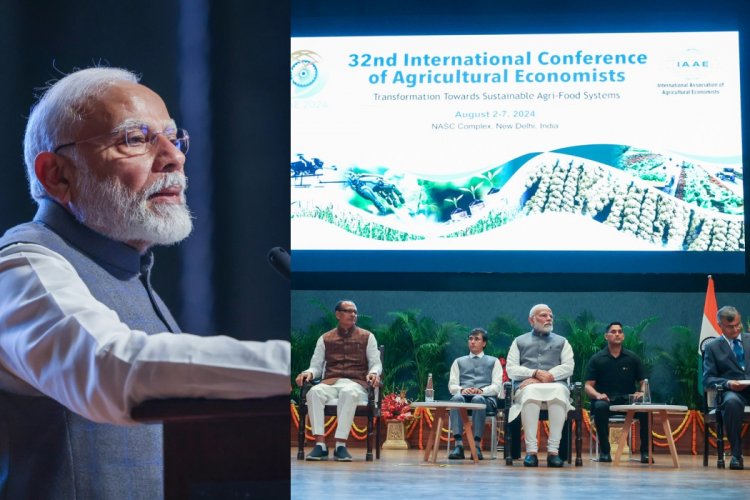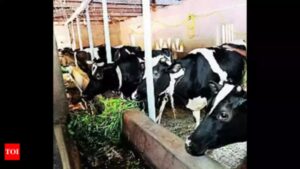
Prime Minister Narendra Modi has emphasized the critical role of India’s small farmers, who make up 90 percent of the farming community, in ensuring food security. Inaugurating the 32nd International Conference of Agricultural Economists at the National Agricultural Science Centre Complex on Saturday, he highlighted initiatives promoting natural and climate-resilient farming.
The conference, themed “Transformation Towards Sustainable Agri-Food Systems,” seeks to address the urgent need for sustainable agriculture amidst global challenges such as climate change, resource degradation, rising production costs, and conflicts. The event saw participation from around 1,000 delegates representing 75 countries.
In his address, Prime Minister Modi expressed his delight at hosting the ICAE in India after a 65-year hiatus. He welcomed dignitaries on behalf of India’s 120 million farmers, including 30 million women farmers, 30 million fishermen, and 80 million animal keepers. Emphasizing India’s agricultural diversity, he noted the nation’s vast livestock population of over 500 million.
Highlighting Ancient Agricultural Traditions
Highlighting India’s ancient agricultural heritage, Modi referenced the ‘Krishi Parashar’,’ a nearly 2000-year-old treatise on agriculture, underscoring the longevity of Indian agricultural traditions that prioritize science and logic. He pointed out the robust agricultural research and education system in India, mentioning the Indian Council of Agricultural Research (ICAR) with over 100 research institutes and more than 500 agricultural colleges.
Unique Agro-Climatic Zones and Agricultural Transformation
Modi underscored India’s unique agricultural landscape, characterized by 15 distinct agro-climatic zones, contributing to the country’s diverse agricultural output. He contrasted India’s current status as a food surplus nation with its challenging food security situation 65 years ago, highlighting the country’s transformation into the largest producer of milk, pulses, and spices, and the second-largest producer of food grains, fruits, vegetables, cotton, sugar, tea, and farmed fish.
India’s Commitment to Global Welfare
Reiterating India’s commitment to global welfare, Modi highlighted initiatives like ‘One Earth, One Family, and One Future,’ ‘Mission LiFE,’ and ‘One Earth One Health,’ emphasizing the holistic approach needed to tackle sustainable agriculture and food system challenges.
Addressing the International Conference of Agricultural Economists. We are strengthening the agriculture sector with reforms and measures aimed at improving the lives of farmers. https://t.co/HfTQnCWkvp
— Narendra Modi (@narendramodi) August 3, 2024
Addressing Nutrition Challenges with Millet
Acknowledging the nutrition challenge alongside water scarcity and climate change, Modi presented millet (Shri Anna) as a solution, given its minimal water requirements and high production yields. He expressed India’s readiness to share its millet varieties globally, noting the previous year’s celebration of the International Year of Millets.
Integrating Modern Technology in Agriculture
Modi detailed the integration of modern technology in agriculture through initiatives like the Soil Health Card, solar farming, the e-Nam digital agriculture market, Kisan Credit Card, and PM Fasal Bima Yojana. He highlighted advancements such as micro-irrigation, ethanol blending, and the digital public infrastructure for real-time crop survey data, which benefit farmers and enhance global food security.
Concluding his address, Prime Minister Modi expressed confidence that the ICAE conference would foster significant discussions on connecting the world with Sustainable Agri-Food Systems. The conference, organized by the International Association of Agricultural Economists, will continue until August 7, 2024, providing a platform for young researchers and professionals to present their work and network with global peers.
Union Minister for Agriculture and Farmers’ Welfare, Shivraj Singh Chauhan, NITI Aayog Member Prof Ramesh Chand, Conference President Prof Matin Qaim, and Secretary of DARE and DG ICAR, Dr. Himanshu Pathak, were also present at the event.






